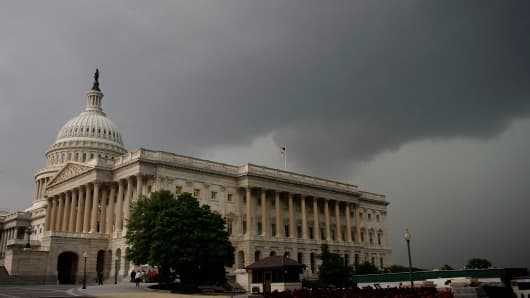Everyone is talking about the looming “fiscal cliff,” but just how likely is the United States to go careening over it? Pretty likely, says former Obama economic advisor Jared Bernstein.
In an interview, Bernstein said no matter who wins the Presidency this fall, the fiscal cliff may be unavoidable. “If you actually play out the difference scenarios here, the President wins, Romney wins — it’s hard to see that we don’t go off this fiscal cliff,” Bernstein said. “Because I don’t see how this compromise gets made.”
That said, Bernstein argues that the fiscal cliff may not be the economic nightmare scenario many pundits have described. Bernstein thinks it’s possible to go over the cliff early in 2013, but not for long, and that Washington will come to a deal once the pain kicks in.
“If we can reverse it in a matter of two or three weeks — and there is a scenario in which that can happen — that would do a lot less damage to the economy than if we stayed over the cliff,” he said. Bernstein is currently a fellow at the Center on Budget and Policy Priorities and a CNBC contributor.
The fiscal cliff is a series of politically imposed deadlines on tax and spending policy that are all set to hit at the same time at the end of 2012. Taken together, many analysts argue that a massive decrease in federal spending and increase in federal taxation could paralyze the economy just as it is struggling to creep out of recession.
A recent JPMorgan research report suggested that if the country goes over the fiscal cliff, it “would lead to an almost certain recession.” By JPMorgan’s count, the tax hikes and spending cuts looming at the end of the year total over $500 billion — almost 4 percent of gross domestic product.
Add to that what’s being called the “monetary cliff,” which is a deadline imposed by the Federal Reserveon itself to wind down its so-called “Operation Twist” monetary stimulus. Ending that at the same time as the other measures come to a head could put the economy in an even deeper hole.
Here’s what’s slated to end by the end of the year:
The US government is expected to hit the debt ceiling of $16.394 trillion by the end of 2012, although Treasury has ways of stretching this that could push that deadline into the early part of 2013.
Speaker Boehner has said he’ll only support extending the debt limit again if there are spending cuts put in place that are larger than the debt increase itself. That, plus Democrats’ insistence on increased taxes, could force a rerun of last year’s damaging debt ceiling debate.
The Bush tax cuts are slated to expire by the end of this year, too. Democrats and the President want to extend them only for those making less than $250,000 per year, while Republicans would like to extend the entire set of cuts. In the context of the debt debate, this will be a tricky one to resolve.
Remember the “sequester?” That’s the term for automatic spending cuts set to kick in at the end of this year because last year’s super committee was unable to reach a spending deal. The cuts total about $1.2 trillion, and they start January 2, split between defense and domestic spending and causing an estimated 15 percent across the board cut at the Pentagon.
Throw in a payroll tax holiday expiration and emergency unemployment benefits ending at the end of the year as well, and we’re looking at a very tough New Year’s Eve in Washington.
So what’s going to happen? Politicians will certainly strive to craft a deal that avoids most of the pain — but that’s complicated by the presidential election in November. It’s nearly impossible to imagine a scenario whereby they cut a deal before election day, so that gives leaders just about a month and a half to figure something out.
If President Obama wins a second term, we could see a return to the impasse that has defined the last two years: Democrats insist on tax increases, Republicans insist on spending cuts, and no deal gets done. But if Obama loses in November, Mitt Romney would not be sworn in until late January — after the fiscal cliff deadlines. That would put him in the awkward position of trying to broker a deal while still just president-elect, without the authority of the presidency.
That’s why Bernstein thinks we’re going over the cliff — politicians won’t be able to come to a deal until the pain kicks in.
-By CNBC's Eamon Javers
@EamonJavers



